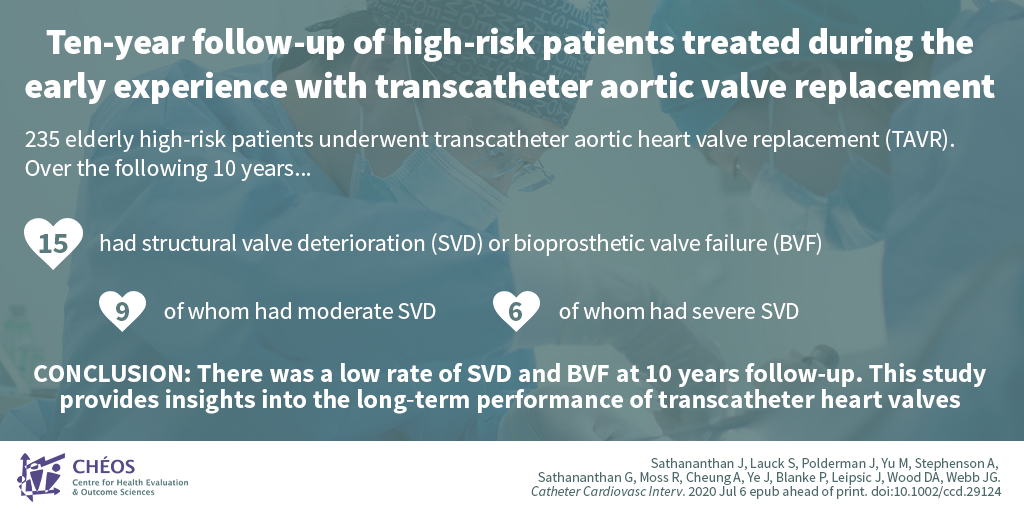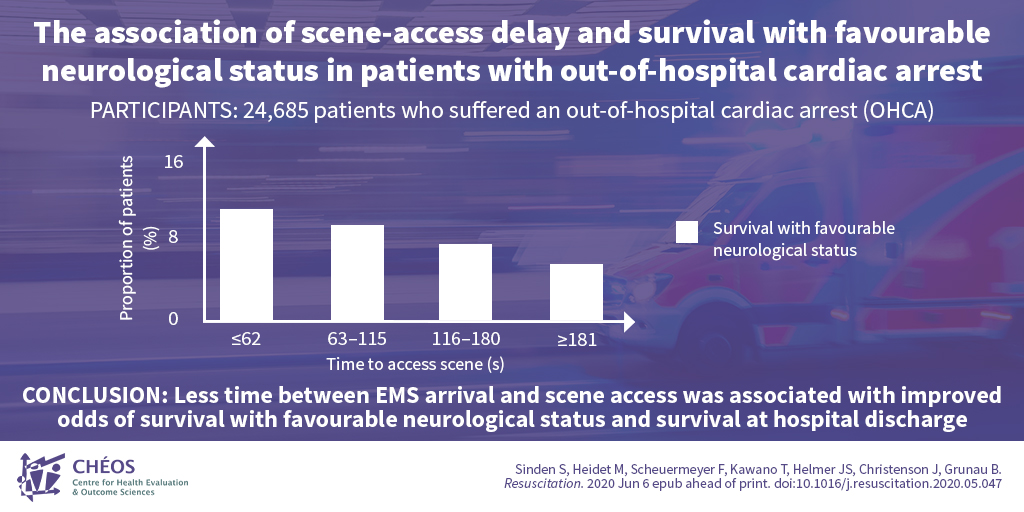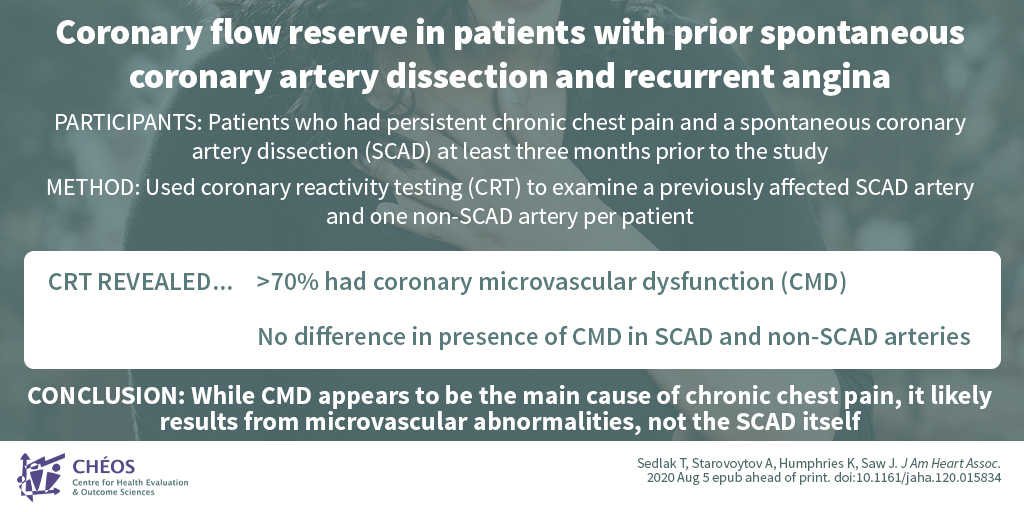The Evidence Speaks Series is a recurring feature highlighting the latest in CHÉOS research. This series features summaries of select publications and is designed to keep media and the research community up-to-date with CHÉOS’ current research results in the health outcomes field. In recognition of Heart Month, this edition focuses on cardiovascular research.
To ensure this research is quick and easy to share, we are now providing social cards that you are free to save and use as you see fit.
Promising long-term potential of transcatheter aortic heart valve replacement
Sathananthan J, Lauck S, Polderman J, Yu M, Stephenson A, Sathananthan G, Moss R, Cheung A, Ye J, Blanke P, Leipsic J, Wood DA, Webb JG. Ten year follow-up of high-risk patients treated during the early experience with transcatheter aortic valve replacement. Catheter Cardiovasc Interv. 2020 Jul 6 epub ahead of print.
CHÉOS Scientist Dr. Sandra Lauck joined colleagues from the Centre for Heart Valve Innovation at St. Paul’s Hospital to assess clinical outcomes in the 10 years following a transcatheter aortic heart valve replacement (TAVR). Of the total cohort of 235 elderly high-risk patients, 15 (6.5 per cent) had structural valve deterioration or bioprosthetic valve failure over the course of the study period, six of whom had severe outcomes. The study highlighted that there was a low rate of these outcomes within the 10-year follow-up in a high-risk patient population, indicating future potential for TAVR.

Delayed access to the scene of a cardiac arrest associated with worse outcomes
Sinden S, Heidet M, Scheuermeyer F, Kawano T, Helmer JS, Christenson J, Grunau B. The Association of Scene-Access Delay and Survival With Favourable Neurological Status in Patients With Out-Of-Hospital Cardiac Arrest. Resuscitation. 2020 Jun 6 epub ahead of print.
CHÉOS Scientists Drs. Jim Christenson and Brian Grunau, Program Head – Emergency Medicine Dr. Frank Scheuermeyer, Communications & Knowledge Translation Manager Sean Sinden, and team investigated whether the time between emergency medical service (EMS) arrival on scene and access to out-of-hospital cardiac arrest (OHCA) patients could be associated with patient outcomes. Analyzing 24,685 patients’ data, the researchers determined that a shorter on-scene delay in accessing patients was associated with improved odds of survival with favourable neurological status and survival at hospital discharge. More specifically, a two-minute interval between arrival and patient care seemed most beneficial and may represent an appropriate target for future quality improvement initiatives.

Spontaneous coronary artery dissection may not be the cause of subsequent chronic chest pain
Sedlak T, Starovoytov A, Humphries K, Saw J. Coronary Flow Reserve in Patients With Prior Spontaneous Coronary Artery Dissection and Recurrent Angina. J Am Heart Assoc. 2020 Aug 5 epub ahead of print.
CHÉOS Scientist Dr. Tara Sedlak and Program Head – Cardiovascular Health Dr. Karin Humphries worked with Drs. Andrew Starovoytov and Jacqueline Saw to determine whether coronary microvascular dysfunction (CMD) contributes to chronic chest pain after a spontaneous coronary artery dissection (SCAD; a tear in an artery in the heart). The researchers found that over 70 per cent of study participants had CMD, suggesting that it may be the main cause of chronic chest pain after a SCAD. However, they also found CMD was present in non-SCAD arteries, suggesting that microvascular abnormalities are the underlying cause of the pain, not the SCAD itself.

At a glance…
Below, you can view, save, and use social cards for additional recent publications from CHÉOS Scientists.
CHÉOS Program Head – Decision Sciences Dr. Nick Bansback, Centre Director Dr. Aslam Anis, Scientist Dr. Mark Harrison et al.
Patient-provider communication about medication cost in rheumatoid arthritis
Click here to view
CHÉOS Program Head – Health Services and Outcomes Dr. Jason Sutherland et al.
Measuring the impact of delayed access to elective cholecystectomy through patient’s cost-utility: an observational cohort study
Click here to view
CHÉOS Scientist Dr. Kamran Shojania et al.
Rheumatology health care providers’ views and practices on obesity and smoking cessation management in rheumatoid arthritis
Click here to view



